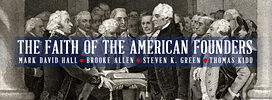Lead Essay
Mark David Hall argues that the American founders were more Christian and less deist than many nowadays might realize. The common values and language supplied by orthodox Christianity gave them a particular understanding of mankind’s place in the world, and it shaped their understanding of both the right to life and religious liberty. No skeptical Enlightenment was needed for the latter;
Response Essays
Brooke Allen argues that while the American founders thought virtue was essential to good government, there were other ideals of virtue besides those of religion. She suggests that the idea of civic virtue did much of the work, in the founders’ minds, that was supposed to preserve the republic. She adds that while a large majority of Americans were Calvinists at the time of the founding, the founders owed more of their political thought to Montesquieu than they ever did to Calvin.
Faith played a strong role in the American founding, says Prof. Thomas Kidd. But it may not be the role we expect. “Deism” meant several different things at the time, and it’s not always clear what the founders meant when they used the term to describe themselves. And even religious freethinkers in the 18th century would be thoroughly versed in the Bible; this was a mark of education, but not necessarily of orthodoxy.
Prof. Steven Green argues that the founders were trying to create a government based on consent, and not on any theory of divine right. The document was not “godless,” because the founders were not godless men themselves. They were concerned, however, that consent remain at the forefront, and so they avoided the language—common at the time—that would have asserted a divine institution.
Coming Up
Conversation through the end of the month.

